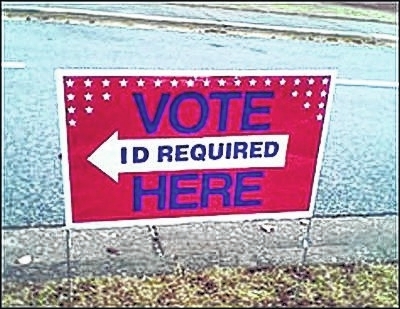The Board of Elections discussed the impact of the voter identification law during the board’s meeting last Tuesday.
Board members said they learned more details about the law during a conference earlier this month, but that the law has a long list of acceptable exceptions.
The law, which will go into effect in 2016, requires North Carolina voters to show photo identification when they go to the polls to cast their vote. Voters can present a N.C. driver’s license, U.S. passport, veteran’s identification card, N.C. identification card, military identification, or tribal enrollment card, according to the state’s website on the law at VoterID.NC.gov.
There is a lengthy list of exceptions to the law, however, including “reasonable impediments” such as family responsibilities, lost I.D., lack of transportation, work schedule, and more. Other exceptions include religious objections and natural disasters.
With such a long list of exceptions, nearly all of which would be impossible to prove by election officials, the local board discussed how much weight the law will have.
New board member Tracy Little commented on the information he received about the law during the conference. “What really got me is that the I.D. is important, but then if you listen to them, it seems like the I.D. is not important,” he said. “Because it went to the point where you’re able to come up and say, if they asked for I.D., that you don’t have I.D. and transportation, and we can’t deny them their right to vote because they didn’t have transportation.”
Board member Tracy Baynard said that others at the conference asked why the law is there if there are so many loopholes. “What they said was, this is what we have to go by,” she said. “You’re not there to decide if they had transportation, because you don’t know. If I tell you I didn’t have transportation, you don’t really know if I have transportation.”
Board chairperson Rochelle Williams said that those who vote without a photo I.D. will have to cast a provisional ballot, which will not be accepted in the voting machines.
Instead, provisional ballots are approved or rejected by the local board. “This board has the final say over all provisional ballots,” Williams said. “This is how it works: if you can find anything, like if they’ve been inactive or purged and they want to vote provisional, they can do so, and we can still count it, if we’ve seen on the records where they’ve been in as a voter. Now, if we don’t find anything from DMV or anything, it’s questionable. Then, we have to decide if we approve or deny.”
During the meeting, the board also approved its list of election chief judges and judges. Those appointed were sent letters notifying them of the appointment, which they could accept or turn down. Chief judges and judges serve two-year terms.
Assistants will be appointed at a later date.
A policy was approved requiring individuals who wish to appear on a meeting agenda to request to appear by the Thursday before the meeting by no later than 5 p.m.
The board will hold a regular meeting on Oct. 13 at 5 p.m. at the office of the Anson County Board of Elections, located at 402 Morven Road, Wadesboro.

